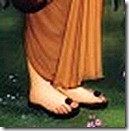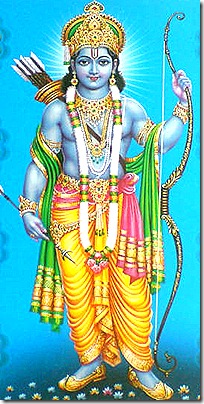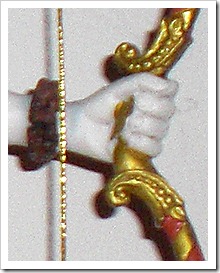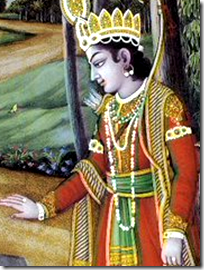 “Welcoming his dear guest and worshiping his feet, the king said, ‘Because you have visited I don’t think anyone is as fortunate as I am.’” (Janaki Mangala, 16) “Welcoming his dear guest and worshiping his feet, the king said, ‘Because you have visited I don’t think anyone is as fortunate as I am.’” (Janaki Mangala, 16)
pūji pahunaī kīnha pāi priya pāhuna |
kaheu bhūpa mohi sarisa sukṛta kie kāhu na ||
Little did King Dasharatha know that the initial words of praise he offered to his revered guest would come back to bite him, for what was first considered a great fortune would turn out to be a painful jab to the heart of this decent ruler, who for all his righteousness was completely attached to his eldest son. Not to fear though, as there would be a silver lining to the dark cloud of separation. Auspiciousness would arrive due to the desires of the worshiped guest. The youthful son and His younger brother would escort the venerable sage, who had come to visit the king to get his permission for their company. Through the direction of the muni, the two brothers would eventually make their way to thetilaka of the earth, Tirahuta, where a grand ceremony was taking place to determine the marriage of the daughter of King Janaka, Sita Devi
 It is not that only the criminals, miscreants and evildoers cause pain. The saints and their worshipable figure do so as well; such is the duality of the world that we currently occupy. A criminal causes pain to the person they steal from, and the philanderer to their lawfully wedded spouse. The liar inflicts hurt upon those they cheat. The impious ruler cloaks the citizens in a shroud of ignorance, to the point that they can no longer even make out what is the right course of action and what isn’t. Piety and virtue are marked as such for achieving future benefits that continue into the afterlife. The proper set of regulations necessary for achieving a favorable outcome can be considered a system of piety, or dharma. Anything which goes against these regulations, and which thereby jeopardizes the successful outcome, gets tagged as sin. It is not that only the criminals, miscreants and evildoers cause pain. The saints and their worshipable figure do so as well; such is the duality of the world that we currently occupy. A criminal causes pain to the person they steal from, and the philanderer to their lawfully wedded spouse. The liar inflicts hurt upon those they cheat. The impious ruler cloaks the citizens in a shroud of ignorance, to the point that they can no longer even make out what is the right course of action and what isn’t. Piety and virtue are marked as such for achieving future benefits that continue into the afterlife. The proper set of regulations necessary for achieving a favorable outcome can be considered a system of piety, or dharma. Anything which goes against these regulations, and which thereby jeopardizes the successful outcome, gets tagged as sin.
The miscreant causes pain to others and themselves because they live off of sin. Through ignorance of the purpose to the regulations and the objectives they are trying to reach, or through blatant defiance of the proper path, the impious accept the wrong set of activities. If you build a house the wrong way, the deserved painful reaction will occur eventually. Just because you don’t see the reaction right away doesn’t mean that it will not arrive. Many thousands of years ago, a band of night-rangers [nishacharas] raided the peaceful and serene forests of Dandaka, terrorizing the innocent sages who had taken refuge of the calm confines. Since the sages were helpless and nonviolent and the night-rangers powerful and capable of changing shapes at will, there was really no contest in the battle.
 Why would anyone attack innocent sages? Obviously, to do so one has to be completely ignorant of righteousness. That ignorance causes an enhanced sense of fear. The root cause of the ignorance is the attachment to the temporary body, a form which is destined for destruction. Knowledge of impending death coupled with ignorance of the eternal existence of the spirit soul results in the foolish taking sense gratification to be the ultimate objective in life. Dharma in its original sense has nothing to do with temporary ups and downs relating to a body that is not tied to the essence of individuality, the spirit soul. Dharma as a guiding system is instituted to create the proper path, where detachment from the temporary steadily increases. Why would anyone attack innocent sages? Obviously, to do so one has to be completely ignorant of righteousness. That ignorance causes an enhanced sense of fear. The root cause of the ignorance is the attachment to the temporary body, a form which is destined for destruction. Knowledge of impending death coupled with ignorance of the eternal existence of the spirit soul results in the foolish taking sense gratification to be the ultimate objective in life. Dharma in its original sense has nothing to do with temporary ups and downs relating to a body that is not tied to the essence of individuality, the spirit soul. Dharma as a guiding system is instituted to create the proper path, where detachment from the temporary steadily increases.
The ignorant mind has no knowledge of dharma. The level of stupidity can get so high that sometimes the people that are abiding by dharma are seen as enemies. If I don’t have any scruples, if my belief is that my identity was created at the time of birth and will dissipate at the time of death, I will obviously want to cram as much enjoyment as possible into the short duration of existence that I have. Rules be damned, for what does it matter if someone else is happy? How is their happiness going to do anything for me? Rather, let me just enjoy as much as possible and squelch any competition.
The nishacharas were so ignorant that they didn’t stop at competing with others who were interested in sense gratification. The sages in the forest were religious, and through their spiritual practices they could teach others about the proper aim in life, how to live according to dharma and how to remain detached from the senses. The light of knowledge is the greatest threat to those who live under the veil of darkness. For the ignorant the best option is to root out the competition, for in the arena of ideas there is no competition. How can an uneducated young child argue high points of philosophy with an older person who has experienced what life has to offer and who knows about impending death?
In the realm of spirituality, the nishacharas, or those atheists blinded by mental darkness, are like the uneducated children and the saints given to dharma the educated class. The difference with the night-rangers was that they were mature in bodily development, so they could use brute force to defeat their competition. So vile were these creatures that they would eat the flesh of the sages after killing them. Not understanding how karma works and how negative reactions are due to arrive in the future in the proper season, the night-rangers thought they were safe.
The famous ascetic Vishvamitra was being harassed by these ghoulish creatures, and instead of using his spiritual strength to counterattack their effect, he went to the king of the land, Maharaja Dasharatha, to get personal protection. A brahmana, or priest of the Vedic tradition, can cast spells against enemies, but by so doing they lose some of their spiritual merits, which are difficult to accumulate. The kshatriya, or warrior caste, is in charge of providing protection to all members of society, especially the brahmanas.
Vishvamitra didn’t come to Ayodhya to get Dasharatha’s personal protection. The sage knew that the king’s eldest son, though still young at the time, was more than capable of defeating the Rakshasas. That famous son, named Rama, would many years later defeat 14,000 of the most capable night-rangers all by Himself. In the final confrontation of that battle, Rama informed the opposing group’s leader, Khara, that the gruesome reactions to his horrible work of killing sages was coming to him in the form of death. That death would be instigated by the arrows flying from Rama’s bow.
 At the time of Vishvamitra’s visit a much younger Rama was still capable of providing protection to the sage. King Dasharatha, not knowing the purpose for the visit, got up and welcomed the sage, worshiping his feet and declaring that the visit had made him the most fortunate. A pious king like Dasharatha had already proved his high character by getting such a wonderful son like Rama, who was loved and adored by everyone in the community. Rama’s younger brother Lakshmana At the time of Vishvamitra’s visit a much younger Rama was still capable of providing protection to the sage. King Dasharatha, not knowing the purpose for the visit, got up and welcomed the sage, worshiping his feet and declaring that the visit had made him the most fortunate. A pious king like Dasharatha had already proved his high character by getting such a wonderful son like Rama, who was loved and adored by everyone in the community. Rama’s younger brother Lakshmana
Vishvamitra was famous at the time for his dedication to austerity, and his visit to Ayodhya meant that some of his auspiciousness would be shared with the royal family. In an ideal system, the warrior class provides protection under the expert guidance of the brahmanas. Think of how a politician takes advice on strategy from his campaign advisors. A military man is more focused on showing dexterity on the battlefield, so he is not expected to be supremely knowledgeable on things like dispassion, the meaning of life, and how to act properly in the many different situations that arise.
The brahmanas are completely dedicated to their craft of knowledge gathering, not spending time in fruitive ventures. They don’t earn money to maintain a living, they don’t fight against enemies, nor do they offer menial service to others. Even if they are relegated to these activities, they do them with detachment, maintaining their focus on the primary aim of dharma, that of connecting with the soul of all living beings. That supreme energy is all-pervading and in its original form is a person, a supreme one at that.
Since they know this all-pervading spirit, which is called Brahman, the brahmanas are enlightened. They can give so much good advice to any person fortunate and humble enough to accept it. Dasharatha exhibited the proper attitude when receiving Vishvamitra, and he didn’t exaggerate when he stated that he had become blessed with auspicious merits, or sukriti, through the association. What the king didn’t know was that Vishvamitra had come to take away his beloved son Rama.
 The king did not want to part with Rama, but his deference to dharma took precedence over his attachment. Rather than break protocol and go against the words of the brahmanas, Dasharatha eventually relented and allowed Rama to accompany Vishvamitra. With Lakshmana following Him, Shri Rama would defend the sage’s fire sacrifices, which were for the benefit of society as a whole. Just as a priest gives an auspicious prayer for the benefit of a community, the sacrifices of the brahmanas are to satisfy both the source of Brahman and its many different sparks. The king did not want to part with Rama, but his deference to dharma took precedence over his attachment. Rather than break protocol and go against the words of the brahmanas, Dasharatha eventually relented and allowed Rama to accompany Vishvamitra. With Lakshmana following Him, Shri Rama would defend the sage’s fire sacrifices, which were for the benefit of society as a whole. Just as a priest gives an auspicious prayer for the benefit of a community, the sacrifices of the brahmanas are to satisfy both the source of Brahman and its many different sparks.
Dasharatha’s son was no ordinary prince. He was the very original Personality of Godhead, the source of Brahman. Lord Rama had come to earth to enact wonderful pastimes, to give pleasure to the likes of Dasharatha and Vishvamitra. Each exalted figure had their specific association they desired, so Rama played different roles to provide that satisfaction. In this way the night-rangers served as a wonderful contrast, showing what the demoniac tendencies are and how they are opposed to the divine inclinations followed by the saintly class, which can extend even beyond the brahmanas.
Though when Rama left Ayodhya His father felt sad, the move would earn the king the goddess of fortune as a daughter-in-law. After accompanying Vishvamitra for a while, Rama and Lakshmana made their way to the kingdom of Videha, where a contest was being held to determine the husband for King Janaka’s daughter Sita. Once again, the same Vishvamitra would visit a kingdom and be well worshiped, but instead of taking Rama away, this time he would bring the Lord’s presence to a kingdom. At Vishvamitra’s behest, Rama would lift the extremely heavy bow of Lord Shiva’s and win Sita’s hand in marriage.
The son of Gadhi, the venerable Vishvamitra, in his heart carries love for the Supreme Lord in His form as Lord Rama. From that quality the muni beams with transcendental knowledge and auspiciousness. Whoever he visits becomes blessed by his association. King Dasharatha showed the proper attitude in welcoming his exalted guest, and from that treatment auspiciousness would come his way as well. Rama and His three younger brothers would be married in Janakpur, and the newlyweds would all return home to Ayodhya. Thus the royal family expanded with the most beautiful princesses arriving, headed by Janaka’s eldest daughter Sita. To this day people still sing of Sita and Rama’s marriage, and they also remember the events that led up to it. The blessed rajarshi, Maharaja Dasharatha, received the auspiciousness due him by following dharma and kindly welcoming the worshipable Vishvamitra. Those who honor and respect the same transcendental family and regularly remember their activities will never be without light in this world otherwise ruled by darkness.
In Closing:
When sage visited little did king know,
That from his home eldest son would soon go.
From good deeds one earns pious credits,
From sage’s visit king couldn’t count merits.
To have dust from lotus feet of devotee,
Great blessing, divine vision soon to see.
With king pious credits to cause separation,
From son Rama, to serve as sage’s protection.
Never mind, for the move to do good to all,
Mighty night-rangers to suffer terrible fall.
|
Search This Blog
Thursday, December 29, 2011
Little Did He Know
Subscribe to:
Post Comments (Atom)
No comments:
Post a Comment